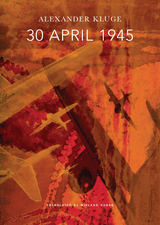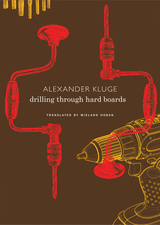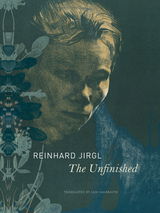4 books about Jirgl, Reinhard

30 April 1945
The Day Hitler Shot Himself and Germany's Integration with the West Began
Alexander Kluge
Seagull Books, 2015
A reissue of Alexander Kluge's kaleidoscopic view of a historically important day and its effects on many people’s lives.
April 30, 1945, marked an end of sorts in the Third Reich. The last business day before a national holiday and then a series of transfers of power, April 30 was a day filled with contradictions and bewildering events that would forever define global history. It was on this day that while the Red Army occupied Berlin, Hitler committed suicide in his underground bunker, and, in San Francisco, the United Nations was being founded.
Alexander Kluge’s latest book, 30 April 1945, covers this single historic day and unravels its passing hours across the different theaters of the Second World War. Translated by Wieland Hoban, the book delves into the events happening around the world on one fateful day, including the life of a small German town occupied by American forces and the story of two SS officers stranded on the forsaken Kerguelen Islands in the South Indian Sea. Kluge is a master storyteller, and as he unfolds these disparate tales, one unavoidable question surfaces: What is the appropriate reaction to the total upheaval of the status quo?
Presented here with an afterword by Reinhard Jirgl, translated by Iain Galbraith, 30 April 1945 is a riveting collection of lives turned upside down by the deadliest war in history. The collective experiences Kluge paints here are jarring, poignant, and imbued with meaning. Seventy years later, we can still see our own reflections on the upheaval of a single day in 1945.
April 30, 1945, marked an end of sorts in the Third Reich. The last business day before a national holiday and then a series of transfers of power, April 30 was a day filled with contradictions and bewildering events that would forever define global history. It was on this day that while the Red Army occupied Berlin, Hitler committed suicide in his underground bunker, and, in San Francisco, the United Nations was being founded.
Alexander Kluge’s latest book, 30 April 1945, covers this single historic day and unravels its passing hours across the different theaters of the Second World War. Translated by Wieland Hoban, the book delves into the events happening around the world on one fateful day, including the life of a small German town occupied by American forces and the story of two SS officers stranded on the forsaken Kerguelen Islands in the South Indian Sea. Kluge is a master storyteller, and as he unfolds these disparate tales, one unavoidable question surfaces: What is the appropriate reaction to the total upheaval of the status quo?
Presented here with an afterword by Reinhard Jirgl, translated by Iain Galbraith, 30 April 1945 is a riveting collection of lives turned upside down by the deadliest war in history. The collective experiences Kluge paints here are jarring, poignant, and imbued with meaning. Seventy years later, we can still see our own reflections on the upheaval of a single day in 1945.
[more]

Drilling through Hard Boards
133 Political Stories
Alexander Kluge
Seagull Books, 2019
Max Weber famously described politics as “a strong, slow drilling through hard boards with both passion and judgment.” Taking this as his inspiration, Alexander Kluge brings readers yet another literary masterpiece. Drilling through Hard Boards is a kaleidoscopic meditation on the tools available to those who struggle for power. Weber’s metaphorical drill certainly embodies intelligent tenacity as a precondition for political change. But what is a hammer in the business of politics, Kluge wonders, and what is a subtle touch? Eventually, we learn that all questions of politics lead to a single one: what is political in the first place?
In the book, Kluge masterfully unspools more than one hundred vignettes, through which it becomes clear that the political is more often than not personal. Politics are everywhere in our everyday lives, so along with the stories of major political figures, we also find here the small, mostly unknown ones: Elfriede Eilers alongside Pericles, Chilean miners next to Napoleon, a three-month-old baby beside Alexander the Great. Drilling through Hard Boards is not just Kluge’s newest fiction, it is a masterpiece of political thought.
In the book, Kluge masterfully unspools more than one hundred vignettes, through which it becomes clear that the political is more often than not personal. Politics are everywhere in our everyday lives, so along with the stories of major political figures, we also find here the small, mostly unknown ones: Elfriede Eilers alongside Pericles, Chilean miners next to Napoleon, a three-month-old baby beside Alexander the Great. Drilling through Hard Boards is not just Kluge’s newest fiction, it is a masterpiece of political thought.
[more]

The Fire Above, the Mountain Below
Reinhard Jirgl
Seagull Books, 2020
Reinhard Jirgl’s strikingly individual novel The Fire Above, the Mountain Below demonstrates that he is not only unorthodox in his approach to language, but also difficult to pin down in terms of any genre. Weaving together elements of crime story, Cold War espionage, family tragedy, and a dystopian future, he creates a tapestry of fragile humanity and menacing inhumanity. The investigation of a series of gruesome killings takes a detective inspector into explorations of a secret intelligence programme in former East Germany and the role of a family with a tragic history. The more is uncovered, the more disorienting it becomes, and the reader is drawn into a complex web of discovery and suppression.
[more]

The Unfinished
Reinhard Jirgl
Seagull Books, 2020
A profound novel detailing the brutal legacy of Nazism on four generations of a family in Germany.
Komotau, the Czech Republic, late summer, 1945. Four women—seventy-year-old Johanna, her two daughters Hanna and Maria, and Hanna’s daughter Anna—are ordered by the new Czech authorities to leave their homes and assemble with other Germans at the local train station. They are given thirty minutes—the “wild expulsions” of Sudeten Germans have begun. But where is Anna?
Witnessing the revenge lynching of SS and suspected collaborators on her walk home, she arrives in Komotau to find her family gone. The trek takes the older women via Munich, then Dresden and Magdeburg, to an outpost in the far northwest of the Soviet zone where they settle as farm laborers. Once united again, their hope of one day returning to the heimat—homeland—is both a source of strength and a burden, choking attachments to new surroundings and neighbors. This conflict will prove to be the story of their lives, as well as both the joy and ruin of Anna’s son.
A tale of four generations told in Reinhard Jirgl’s unique and subversively expressive idiom, The Unfinished plays out between the ruins of Nazi Germany and the rise and fall of communist East Germany, the birth of the Berlin Republic, and the shadow of a new millennium.
Komotau, the Czech Republic, late summer, 1945. Four women—seventy-year-old Johanna, her two daughters Hanna and Maria, and Hanna’s daughter Anna—are ordered by the new Czech authorities to leave their homes and assemble with other Germans at the local train station. They are given thirty minutes—the “wild expulsions” of Sudeten Germans have begun. But where is Anna?
Witnessing the revenge lynching of SS and suspected collaborators on her walk home, she arrives in Komotau to find her family gone. The trek takes the older women via Munich, then Dresden and Magdeburg, to an outpost in the far northwest of the Soviet zone where they settle as farm laborers. Once united again, their hope of one day returning to the heimat—homeland—is both a source of strength and a burden, choking attachments to new surroundings and neighbors. This conflict will prove to be the story of their lives, as well as both the joy and ruin of Anna’s son.
A tale of four generations told in Reinhard Jirgl’s unique and subversively expressive idiom, The Unfinished plays out between the ruins of Nazi Germany and the rise and fall of communist East Germany, the birth of the Berlin Republic, and the shadow of a new millennium.
[more]
READERS
Browse our collection.
PUBLISHERS
See BiblioVault's publisher services.
STUDENT SERVICES
Files for college accessibility offices.
UChicago Accessibility Resources
home | accessibility | search | about | contact us
BiblioVault ® 2001 - 2024
The University of Chicago Press









